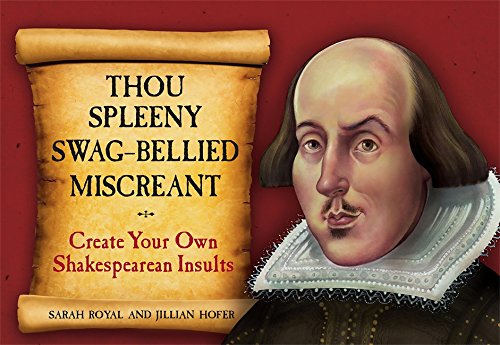When you looking for shakespeare vocabulary, you must consider not only the quality but also price and customer reviews. But among hundreds of product with different price range, choosing suitable shakespeare vocabulary is not an easy task. In this post, we show you how to find the right shakespeare vocabulary along with our top-rated reviews. Please check out our suggestions to find the best shakespeare vocabulary for you.
Best shakespeare vocabulary
1. Vocabulary Power Through Shakespeare
Feature
Used Book in Good ConditionDescription
Book by Popkin, David2. A Shakespeare Glossary
Description
A justly famous aid to the study of Shakespeare, this glossary--originally compiled by C.T. Onions, an editor of the Oxford English Dictionary--clarifies those words in Shakespeare whose senses or connotations may be unfamiliar to the modern reader, paying special attention to dialect forms, idioms, and colloquial phrases. Original in its explanations and illuminating in its definitions, the Glossary brings out the richness and subtley found in Elizabethan English. Incorporating the many advances made in the field since the last (revised) edition was published in 1919, this volume reveals new facts about the meanings of words in Shakespeare, alters previous interpretations, and resolves earlier controversies. In addition, the book takes advantage of two highly accurate, computer based concordances that make every occurrence of each word immediately accessible for investigation and comparison. A reference work without peer, the Glossary is an essential source for students, scholars, playgoers and readers of Shakespeare, and those interested in the history of the English language.3. Shakespeare's Book of Insults, Insights and Infinite Jests
Feature
Used Book in Good ConditionDescription
Presents a collection of insults and humorous quotations from William Shakespeare.4. A Dictionary of Shakespeares Sexual Puns and Their Significance
Feature
Used Book in Good ConditionDescription
'...Rubinstein is far from innocent and comes to our aid with a lot of learning...and is quite right to urge that not to appreciate the sexiness of Shakespeare's language impoverishes our own understanding of him. For one thing, it was a strong element in his appeal to Elizabethans, who were much less woolly-mouthed and smooth-tongued than we are. For another, it has constituted a salty preservative for his work, among those who can appreciate it...an enlightening book.' A.L.Rowse, The Standard.5. Recovering Shakespeare's Theatrical Vocabulary
Feature
Used Book in Good ConditionDescription
Alan Dessen draws on stage directions from hundreds of plays (from 1425 to 1642) to investigate what a playgoer may actually have seen when watching the original production of Hamlet or Macbeth. He argues for the presence of a shared vocabulary among playwrights, players and playgoers geared to a sense of theater that is easily obscured or eclipsed today. Chapters are devoted to such things as early entrances, the sick chair, vanish effects, tomb scenes, and to the staging of places such as a forest, a shop, a study or a house.6. Thou Spleeny Swag-Bellied Miscreant: Create Your Own Shakespearean Insults
Description
A Shakespearean insult generator that creates tart-tongued and totally humorous bawdy combinations and clever comebacks.Some occasions call for foul language, but why resort to the common F-word? If you must be offensive, hearken back to the Elizabethan days for more salacious and outrageous word choices. Impress your friends with your mastery of lewd iambic pentameter and vanquish your enemies with the power of the bard. After all, a toad-spotted maggot by any other name would be as pestilent . . .
Mix and match to come up with your own raucous rebuffs, including:
- Thou Foul-Reeking Lily-Livered Codpiece!
- Thou Ruttish Rump-Fed Pignut!
- Thou Beslubbering Cockeyed Canker-blossom!
- Thou Churlish Dull-Eyed Hag
And more!
7. Three Great Plays of Shakespeare, Level 4, Penguin Active Readers (Penguin Active Reading)
Description
Part of the 'Penguin Active Reading' series, this book provides a range of integrated activities designed to develop reading skills and consolidate vocabulary, and offers personalised project work.8. Oxford Bookworms Library: William Shakespeare: Level 2: 700-Word Vocabulary (Oxford Bookworms Library, True Stories; Stage 2)
Feature
Oxford University Press USADescription
This award-winning collection of adapted classic literature and original stories develops reading skills for low-beginning through advanced students.Accessible language and carefully controlled vocabulary build students' reading confidence.
Introductions at the beginning of each story, illustrations throughout, and glossaries help build comprehension.
Before, during, and after reading activities included in the back of each book strengthen student comprehension.
Audio versions of selected titles provide great models of intonation and pronunciation of difficult words.
9. Oxford Bookworms Playscripts: Romeo and Juliet: Level 2: 700-Word Vocabulary (Oxford Bookworms Library Stage 2)
Description
Use these fully illustrated classic and contemporary plays for reading practice or performance.Each script offers performance notes, character lists, exercises, and glossaries.











